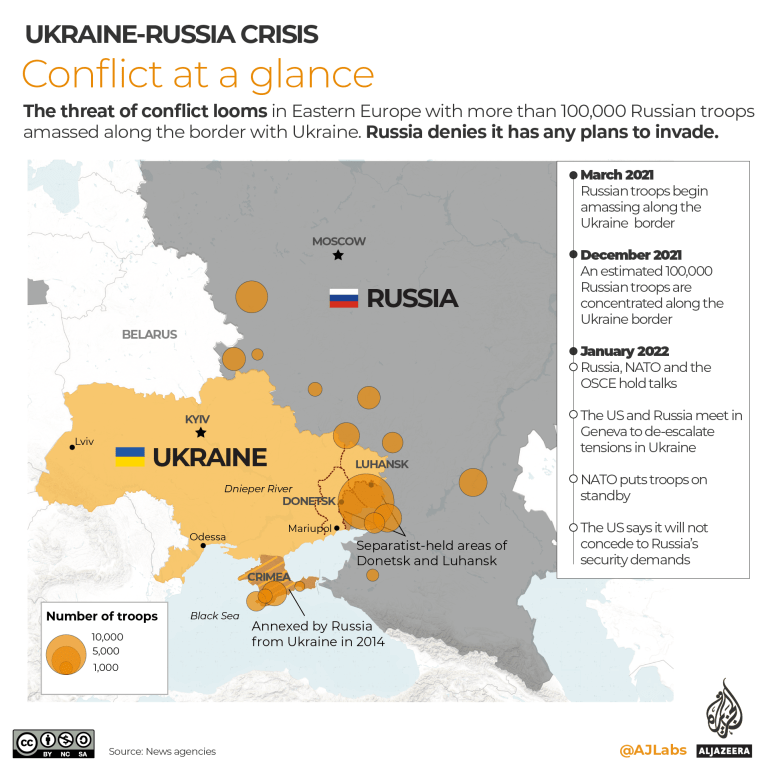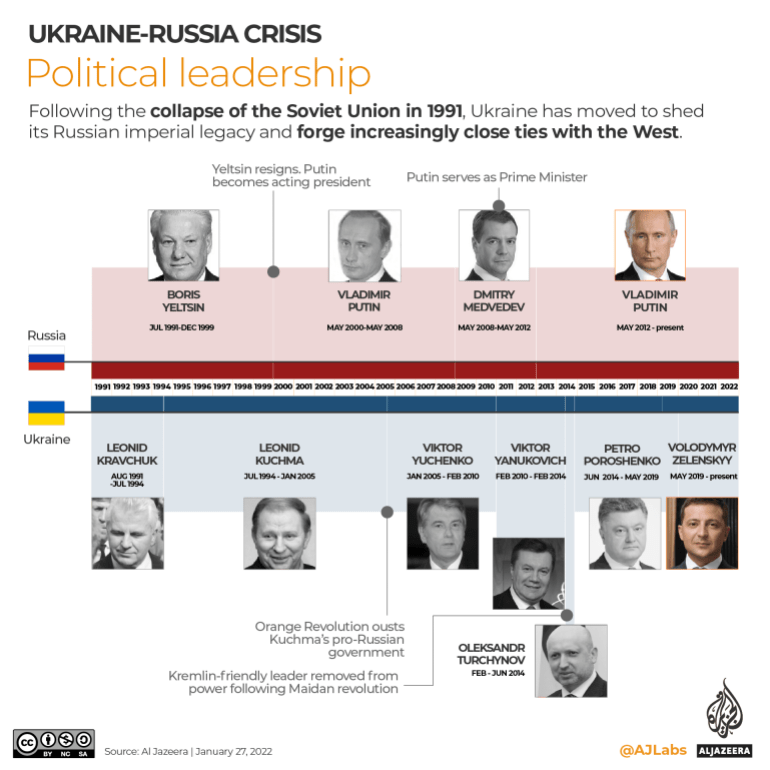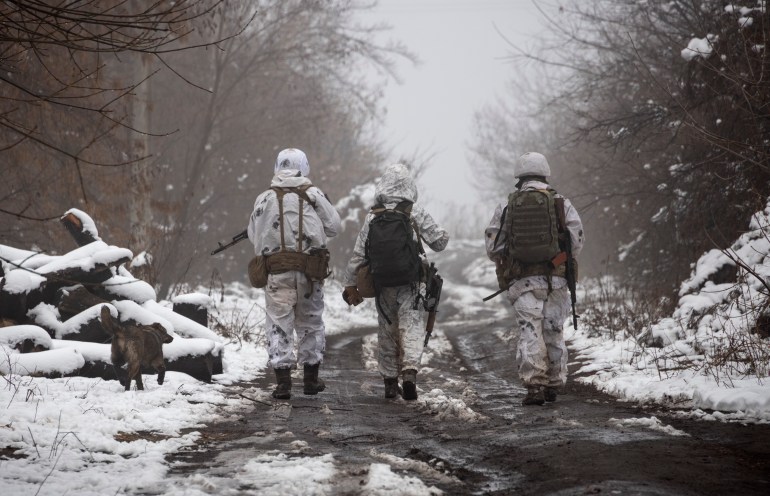Latest Ukraine updates: Macron says resolution may take months
Ukraine news from February 8: After lengthy talks with Putin and Zelenskyy, the French president offers his assessment of the standoff.

Following talks with his Russian and Ukrainian counterparts, French President Emmanuel Macron said any resolution of the Ukraine crisis may yet take months.
Macron, who is trying to revive peace talks aimed at ending almost eight years of deadly fighting in eastern Ukraine, said on Tuesday that his hours-long meeting with Russian President Vladimir Putin a day earlier helped to ensure that “there’s no degradation and no [further] escalation.”
Keep reading
list of 4 itemsUS and Germany working in ‘lockstep’ on Ukraine crisis: Biden
Europe faces ‘most dangerous moment’ over Russia-Ukraine tensions
Ukraine to unleash ‘bloody hell’ on Russia if it invades: Expert
After talking with Ukraine’s Volodymyr Zelenskyy in Kyiv on Tuesday, the French leader added it was imperative to lower the tension.
On the frictions between Russia and the West over Moscow’s military buildup near Ukraine’s borders, Macron said: “I believe for my part that there are concrete, practical solutions that will allow us to move forward.”
He acknowledged Russia’s role in the crisis, adding: “In adopting this threatening posture, Russia decided to put pressure on the international community … We cannot underestimate the moment of tension that we are living through.”
While playing a mediating role, major NATO member France is aligned with Kyiv and Western powers and is moving troops to Romania as part of the alliance’s preparation for possible Russian action.
This live blog is now closed, thanks for joining us. Here are the updates for February 8.
Here are the latest updates:
Germany: Russia invasion of Ukraine would face severe consequences
Finance Minister Christian Lindner has said that Germany was very clear that Russia would face harsh consequences if it invades Ukraine.
Asked about the Nord Stream 2 pipeline, Lindner said he would not speculate about any specific individual sanctions.
Russia warships heading to Black Sea for drills
Six Russian warships are heading to the Black Sea from the Mediterranean for naval drills, the Interfax news agency has cited Russia’s Defence Ministry as saying, in what it said was a preplanned movement of military resources.
The six ships are scheduled to pass through Turkey’s straits to the Black Sea on Tuesday and Wednesday, Turkish sources said.
The move is part of a sweeping set of exercises in the latest show of strength in a surge of military activity.
Read more here.
Macron painting a ‘very realistic picture’
Al Jazeera’s Dorsa Jabbari, reporting from Moscow, says Macron has painted a “very realistic picture” of the crisis during his shuttle diplomacy.
“He said there is an architecture that needs to be looked at in terms of European security,” she said, citing the security order established on the continent in the wake of World War II.
“[He said] this needs to be readdressed … because those agreements are outdated and are no longer working for the continent.”
Washington ‘encouraging ongoing dialogue’
Al Jazeera’s Kimberly Halkett, reporting from Washington, DC, says the United States will welcome Macron’s diplomatic efforts as they fit in with the “dual track” approach to the crisis – of deterrence as well as diplomacy – pursued by the White House.
“[Macron’s diplomacy] is consistent with that and will be received very well [in Washington] because this is something that they are encouraging in the US, this ongoing dialogue,” she said.
Mariupol: War fears in Ukraine’s vulnerable frontier city
As the threat of escalation with Russia looms and tens of thousands of troops build up on Ukraine’s borders, few places in Ukraine are more precariously situated than Mariupol – which was briefly captured by separatists in 2014.
A port city, it is vulnerable from three sides – to the east, the Sea of Azov, where Russian naval ships patrol, and the land to the north and west is controlled by Russian-backed separatists.
Read more here.
Zelenskyy calls for ‘concrete steps’ from Moscow
Ukraine is looking for action from Putin to prove he is serious about de-escalating tensions and pulling back Russian troops from the border, Zelenskyy has said.
“Openness is always great, if it’s true, and not a game, but serious openness, not a joke, and understanding that there is a serious danger,” the Ukrainian president told reporters following his talks with Macron.
“I do not really trust words, I believe that every politician can be transparent by taking concrete steps.”

Macron ‘pushing forward with Normandy format’
Al Jazeera’s Hoda Abdel-Hamid, reporting from Kyiv, says Macron is “clearly pushing forward with the Normandy Format”.
The Normandy format talks between Russia and Ukraine were brokered by France and Germany in 2015 and helped end large-scale hostilities in eastern Ukraine but the conflict has continued to simmer ever since.
“This is a format whereby France, Germany, Ukraine and Russia sit at the same table to try to find some sort of political compromise,” Abdel-Hamid said. “It is one of the few formats where Ukraine and Russia sit face-to-face and can have some sort of direct talk.”
Macron says Russia, Ukraine both committed to Minsk accords
Macron says Putin and Zelenskyy have both committed to honouring the Minsk accords.
“We have now the possibility of advancing negotiations,” Macron told reporters following his talks with the Ukrainian president.
The Minsk set of agreements were signed in 2014 and 2015 by the leaders of Ukraine, Russia, France and Germany as a response to Russia’s annexation of Crimea. They include an aim to end the separatist war by Russian-speakers in Ukraine’s eastern Donbas region.
Severe sanctions on Russia could hit sovereign and banks’ ratings, Fitch says
New possible severe sanctions against Russia could have an adverse impact on its sovereign rating and the banking sector, the Fitch rating agency has said.
“Our base case is that new sanctions would not be sufficiently severe to warrant negative rating actions, but the risk of this scenario has become more significant in recent weeks,” Fitch said.
Among sanctions that the West is considering against Russia are the suspension of the Nord Stream 2 gas pipeline project, blocking Russia’s access to global electronic supplies, penalties against Russian banks and government debt as well as sanctions on individuals.
Measures with a larger sovereign credit impact include preventing systemic banks and corporates from transacting in US dollars or accessing the international payments system, or broad-based energy market sanctions disrupting exports, Fitch said.
Kremlin denies Putin reached deal with Macron
The Kremlin has denied that any agreement was reached between Putin and Macron, saying that “in the current situation, Moscow and Paris could not make any deals.”
Answering a question from reporters on whether Putin was ready to hold direct talks with Zelenskyy, Kremlin spokesman Dmitry Peskov said the Russian leader is prepared “to meet anyone” if it helps solve the crisis.
“But first you need to understand with what purpose we are meeting, what issues [we are discussing] and what potential result we are focusing on,” he told a news briefing.
Denmark boosts military preparedness
Denmark is boosting its military preparedness in response to Russia’s “unacceptable military pressure” on Ukraine by putting a mobile NATO-operational battalion on alert, the country’s defence ministry has said.
The Danish military “will boost the readiness of the combat battalion at NATO’s disposal so that it will be available within one to five days”, compared with the usual 30 days, the ministry said.
The battalion of 700-800 troops will be located in Slagelse, around 90 kilometres (56 miles) west of Copenhagen, it added. The ministry said it would also be ready to send two F-16 fighter jets to its Baltic island of Bornholm “if judged necessary”.
Timeline: Ukraine’s turbulent history
Ukraine has faced significant challenges since winning independence in 1991.
For a timeline of developments, click here.

US reinforcement in Romania under way as first troops arrive
The first US troops reinforcing NATO allies on the alliance’s eastern flank have arrived in Romania, Defence Minister Vasile Dincu says.
Washington is deploying nearly 3,000 extra soldiers to Poland and Romania to shield Eastern Europe from any potential spillover from the Ukraine crisis.
Dincu told reporters about 100 US troops were now on the ground in Romania, handling logistics. “The Americans have arrived,” he said. “It will not be long before the rest of the troops arrive.”
The US currently has about 900 soldiers in Romania, a NATO member since 2004 and host to a ballistic missile defence system, some as part of the NATO force and some under separate bilateral arrangements. France recently said it also plans to send troops to Romania.
Putin agreed to no further ‘escalation’, Macron says
Macron tells reporters ahead of his talks in Kyiv that he managed to convince Putin not to “escalate” the crisis.
“I obtained that there will be no degradation nor escalation,” the French leader said.
“My aim was to freeze the game, to prevent an escalation and open up new perspectives … this objective for me is fulfilled.”
Macron ‘trying to show Europe is at the table’
Al Jazeera’s Abdel-Hamid, reporting from Kyiv, says Macron is “trying to show that Europe is at the table” amid the crisis with his visits to Moscow and the Ukrainian capital.
“It’s not by coincidence that while Macron was in Moscow, the German Chancellor Olaf Scholz was in Washington, these are the two powerhouses of the European Union,” she said.
“The French president … has said this is about Europe, about the future and security arrangements of Europe and that’s why European leaders should be taking the lead when it comes to negotiations about all of this.”
Ukrainian FM welcomes Macron but reiterates Kyiv’s ‘red lines’
Ukraine is looking forward to talks with Macron but will not be forced to cross its own red lines, Foreign Minister Dmytro Kuleba says.
“We are all waiting with interest for the signals that Mr Macron brought from Moscow,” Kuleba told a news briefing.
“But I have repeatedly said that we are open to dialogue, we are constructive, we are looking for a diplomatic solution, but we will not cross our red lines and no one will be able to force us cross them,” he said, speaking alongside visiting counterparts from Austria, the Czech Republic and Slovakia.

Six Russian warships head to Black Sea for drills: Report
Six Russian warships are heading to the Black Sea from the Mediterranean for naval drills, the Interfax news agency reports, citing Russia’s defence ministry.
The ministry said the move was preplanned, Interfax reported. Russia announced last month its navy would stage a sweeping set of exercises involving all its fleets in January and February, from the Pacific to the Atlantic.
Recap: Macron, Putin meet in Moscow
The French and Russian leaders voiced guarded optimism for a breakthrough. Here are some of the top lines from the talks:
- Macron made proposals of “concrete security guarantees” to Putin, including an engagement from both sides against new military action, the launching of a new strategic dialogue and efforts to revive the peace process in Kyiv’s conflict with Moscow-backed separatists in eastern Ukraine.
- “There is no security for the Europeans if there is no security for Russia,” he said.
- Putin said several of Macron’s proposals could be the start of a resolution, but reiterated Moscow’s main security demands.
- “If Ukraine joins NATO and tries to get Crimea back by military means, European countries will automatically be drawn into military conflict with Russia … [and] there will be no winners,” Putin said.
- The pair are due to speak again after Macron meets Zelenskyy.
Putin promised no new manoeuvres near Ukraine for now: Report
Putin promised Macron that Moscow will not carry out new military initiatives near Ukraine for the time being as a precursor to possible de-escalation, a French official has reportedly said.
The Russian leader also agreed that troops taking part in military drills on Belarusian territory near Ukraine’s borders would be pulled back once those war games are over, Reuters quoted the French official as telling reporters on condition of anonymity.
Putin himself did not mention such concessions when he spoke to the media after his meeting with Macron.
Recap: Western worries, Russia’s requests
- Moscow is estimated to have amassed more than 100,000 soldiers near Ukraine, raising fears that it is preparing for a possible invasion.
- The West has warned of sanctions should it invade, including measures targeting Putin and the controversial Nord Stream 2 gas pipeline.
- Moscow says it is not planning an invasion and accuses NATO of the deteriorating security situation.
- The Kremlin wants guarantees to ease the crisis, including commitments from NATO that Ukraine never be allowed to join.
- The United States and NATO have rejected that demand, but Washington is open to discussing other issues, such as arms control.
Ukraine’s army to begin drills with drones, anti-tank missiles on Thursday
Ukraine’s army will conduct military drills from February 10 to 20 in response to Russia’s exercises in Belarus, Ukrainian Defence Minister Oleksii Reznikov has said.
Reznikov told a local TV channel that the manoeuvres beginning on Thursday will see Ukrainian soldiers train with the Bayraktar drones and anti-tank Javelin and NLAW missiles provided to Kyiv by foreign partners.
Russian rouble hits near four-week high
The rouble has reached its strongest level in nearly four weeks, with investors looking for signs of de-escalation.
As of 07:37 GMT, the Russian currency was 0.2 percent stronger against the US dollar at 75.34, having earlier touched 75.14, its strongest level since January 13. It had gained 0.5 percent to trade at 85.87 versus the euro.
The rouble has steadily moved away from a near 15-month low of 80.4125 against the US dollar hit last month. Robust oil prices have helped nudge it back towards firmer footing as has the prospect of continued diplomacy between Moscow and the West.
